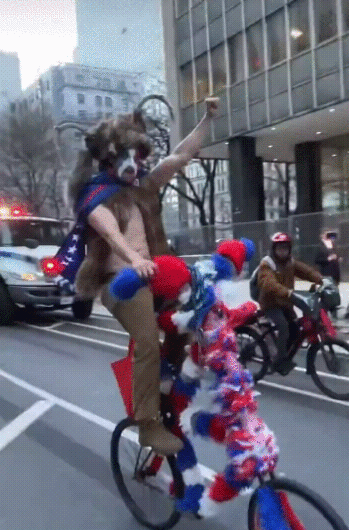#Bike New York
Explore tagged Tumblr posts
Text
Early Bird Registration for TD Five Boro Bike Tour Jan. 3-13
The TD Five Boro Bike Tour is largest charity ride in the world, with some 32,000 who thrill to bike 40 miles of New York City streets turned into car-free bike lanes while supporting Bike New York’s mission to transform the city through cycling © Karen Rubin/goingplacesfarandnear.com Registration is opening Jan. 3 for early bird fees for Bike New York’s Five Boro Bike Tour taking place May 5,…

View On WordPress
#5BoroBikeTour#Bike New York#charity bike ride#NYC 5 Boro Bike Tour#NYC bike tour#TD 5 Boro Bike Tour
0 notes
Photo

April 4, 2023 - A Trump supporter is taken down a peg by a well-aimed skateboard in New York City. [video]
#antifa#antifascism#antifascist action#trump#maga#nyc#new york#new york city#usa#gif#fall#karma#qanon shaman#funny#skateboard#skater#direct action#tall bike#bicycle
12K notes
·
View notes
Text

Young man on a bike, Harlem, 1948.
Photo: Gordon Parks via the Gordon Parks Foundation
#vintage New York#1940s#Gordon Parks#vintage Harlem#bicycle#boy on bike#1940s New York#b&w photography
199 notes
·
View notes
Text
Nueva York, un lugar…
155 notes
·
View notes
Text

72 notes
·
View notes
Text

Man with Cycle - Harlem New York - 1949
photography by Gordon Parks
27 notes
·
View notes
Text




"Life goes in cycles. What comes around, goes around."
Photos by isojordin
#streetwear#air jordan 1#nike#sneakers#bike#bicycle#street photography#me#self#new york#fashion#athleisure#soho#biking#photoshoot
28 notes
·
View notes
Text
So, the media team did the trend of awful photos of the guys
They were not bad, they could’ve been worse
Also, I saw a pic of baby Mat, and now I need to see his reaction

Specifically I saw this picture of baby mat
#mat barzal#new york islanders#the pictures were not that bad#I wanted them to print the picture of mat in a bike or the one where he is dress up asa maid
21 notes
·
View notes
Text

Busy winding walkway near Union Square on Broadway
#Photography#New York City#NYC#Urban#Fujifilm X-T5#I think I like how the big traffic / crossing lights and the twisting bike lane look in this one
10 notes
·
View notes
Text

... bike ride ...
Lower Manhattan, 1939
📷 Ruth Orkin
#bike ride#lower manhattan#ruth orkin#black and white photography#street photography#vintage photography#manhattan#new york#nyc
15 notes
·
View notes
Text

Relax--a useful message going into the holiday season! :-)
Photo: New York, New York
#nyc#new york#new york city#the big apple#the empire state#ny#radio city music hall#manhattan#yellow taxis#bike messenger#christmas#christmastime#holiday season#busy#travel#tourism#adventure#explore#inspiration
7 notes
·
View notes
Text

Wir haben uns fortbewegt, sind angekommen
by AllanOdyne
#photographers#photography#original#canon#artists on tumblr#allanodyne#canon 5d mark iii#travel#usa#new york#new your city#nyc#street photography#cars#road#lines#bike#ride the bike#cobble stone#bridge#beautiful
9 notes
·
View notes
Text

A boy and his bike, ca. 1938.
Photo: Alexander Alland via 1st Dibs
#vintage New York#1930s#Alexander Alland#b&w photography#street photography#bicycles#bikes#tricycle#Central Park#1930s New York
54 notes
·
View notes
Text



Videocall waiting room hanging around 👩💻 + some of yesterday's pretty bicycle ride views 🧡
#IG saw it first#personal#I talked to the New York Times for my thesis (and now have absorbed their power 🥸🧠 haha)#selfie#sunset#bike views#me
34 notes
·
View notes
Text

19 notes
·
View notes
